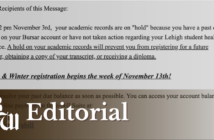Last Wednesday, the Black Student Union hosted a memorial for Michael Brown and others whose lives were unjustifiably lost. The service was significant for a number of reasons, but one less obvious one is that it got people to listen. Speakers let their voices be heard as the audience congregated in silence. No clapping, no responding, just listening. Students and faculty stood for almost an hour in the chilling, gloomy weather, but they stayed. And they listened.
So many times, people jump to conclusions without fully listening, completely misinterpreting the meaning and intent behind a speaker’s words.
When BSU sent emails inviting students to the service, some reacted negatively to its title, #BlackLivesMatter. They concluded that this name negated that other lives matter, too. But nowhere in the statement #BlackLivesMatter is it implied that other lives don’t. It is merely a statement affirming the value of black lives — a statement that reflects the tragic state of the U.S., since the value of a life is something that should never need to be affirmed.
Listening is often seen as a passive act, but truly listening to someone is an active process that requires effort. It means attentively paying attention to what people are saying, why they’re concerned about the things that they are and the meaning behind that. Every word has some significance, but we rarely pay attention to such worthwhile, minute details. The ability to listen is a lost art that not enough people practice.
Too often, we put up barriers to communication by zoning out mid-conversation or projecting our own opinions on others. How many times have you focused more attention on your response to a friend’s story than the story itself as she tells it? Or, when listening to someone’s points in a discussion, how many times do you automatically assume you’ll disagree and prepare your counterarguments instead of considering the merit of theirs first?
If we could actually listen to each other, we could solve a lot of campus issues. We should all strive to be in tune with our campus and its members. Taking the time to show that you care enough to hear people’s thoughts and validate their experiences is vital to mending the tears in our community and improving our interactions with one another.
Sometimes it takes time for messages to be heard and understood. Each year, Lehigh’s community changes as students enter, evolve and leave. Since there is so much turnover in college, it is difficult to keep the momentum of addressing issues and preventing problems from resurfacing.
In 2006, students from a large campus group called The Movement demanded change at an open forum after a skinned deer head was placed in front of Umoja House, a multicultural residence hall. Many of those requests were reflected later when another campus group, From Beneath the Rug, organized a rally in response to the 2013 Umoja House vandalism.
The tension was probably overwhelming for students entering Lehigh, who had only been here for a couple months. On the bright side, a whole year of students was inducted into Lehigh with the realization that these issues exist and deserve recognition. At times, last year’s fall semester felt like a chaotic mess, but through that mess gleamed the voices of students who had important things to say. They spoke out, and many students heard for the first time what they had to say.
This semester, students kept those voices alive and found ways to contribute their own thoughts to our overall campus conversations. This time, first-year students could observe attempts to make Lehigh a more inclusive environment without the catalyst of yet another hateful, disruptive crime.
The point is that there are always students with interesting things to say and different perspectives to offer. But they’re not always standing on a stage compelling your attention. Sometimes it takes an interested listener to draw insight out of others and have the focus to recognize it when they do share.
As we prepare for finals and then dive happily into winter break, let’s not forget how far we have come this semester. We’re far from perfect, but this step toward learning how to respectfully and actively listen to one another is a good start. Next semester is a chance at a fresh start, and we should continue our progress so it doesn’t end here.





Comment policy
Comments posted to The Brown and White website are reviewed by a moderator before being approved. Incendiary speech or harassing language, including comments targeted at individuals, may be deemed unacceptable and not published. Spam and other soliciting will also be declined.
The Brown and White also reserves the right to not publish entirely anonymous comments.